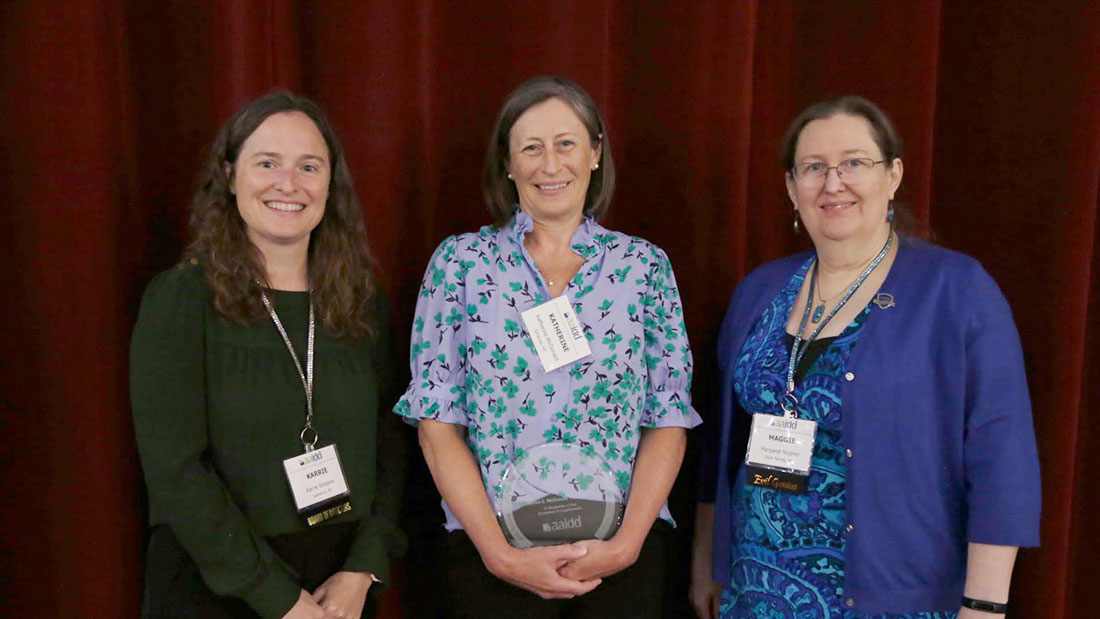
In June, Falk College Associate Dean of Research and Professor of Public Health Katherine McDonald will receive the 2023 Research Award from the American Association on Intellectual and Developmental Disabilities (AAIDD).
The award recognized McDonald’s recent research, but in many ways, it has been years in the making.
For nearly two decades, McDonald has led community-engaged research with people with developmental disabilities and advocated for the responsible inclusion of adults with intellectual disability in research. When she started, there weren’t many other researchers who were involved in that kind of work.
“I am thrilled to say that has changed drastically. Today, there are several of us doing this work, learning together how to infuse disability rights into science,” McDonald says. “Receiving this award from AAIDD is another sign of the groundswell of interest in this area, the recognition of its importance, and new opportunities to further grow and enhance this work.”
McDonald is one of two recipients of the Research Award, which AAIDD Executive Director and CEO Margaret Nygren says “recognizes (McDonald’s) formulations and investigations that have contributed significantly to the body of scientific knowledge in the field of intellectual and developmental disabilities.” George State University Professor of Psychology Rose Sevcik will also receive a Research Award.
McDonald and other awardees were honored at the 147th AAIDD Annual Meeting June 5-7 in Pittsburgh, Pennsylvania.
“Katie’s selection for this year’s Research Award from AAIDD is very fitting,” says Lutchmie Narine, Professor and Chair of the Department of Public Health at Falk College. “It recognizes her lengthy track record of interest and accomplishment in the field of intellectual disability.
“The Department of Public Health is very proud that one of our own is being honored with this nationally recognized award,” Narine adds. “Katie’s research is among the many areas in our department– infectious disease epidemiology, health communication, and health disparities, to name a few–that have attracted significant external grant funding.”
Founded in 1876, AAIDD is the oldest professional association concerned with intellectual and developmental disabilities. McDonald says professional organizations such as AAIDD play a pivotal role in recognizing and responding to changing social circumstances.
“When professional associations are on the right side of history and proactive in the appropriate uptake of new ideas, they can change research policy and practice by, for example, influencing expectations for the methods and focus of research and how new empirical insights are shared in and outside of the scientific community,” McDonald says. “It is great to see AAIDD leaders consciously pursuing initiatives in line with disability rights and encouraging to see the many ways my fellow award winners are doing the same.”
McDonald was honored for research such as this year’s this year study entitled “Eligibility criteria in NIH-funded clinical trials: Can adults with intellectual disabilities get in?” published in Disability and Health Journal. The co-authors were Ariel Schwartz from MGH Institute of Health Professions and Maya Sabatello from Columbia University, and the work was funded by the Collaboration for Unprecedented Success and Excellence (CUSE) Grant Program at Syracuse University. The CUSE grant and McDonald’s ongoing research led to additional funding from the National Institutes of Health to enhance inclusion of adults with intellectual disability in biomedical research.
McDonald discusses that research in more detail in this Q&A. Here, McDonald addresses the evolution of the disability rights movement and how that has dovetailed with her research:
“The disability rights movement has been afoot for decades; each success has led to new areas to push into to further advance disability rights. In my scholarship, I leverage progress and ideas from this anti-ableist social movement to transform how we conduct science. My focus is two-fold.
“First, as we pursue new questions of social importance, we need to re-examine ideas about sources of legitimate knowledge and make room in the scientific process for insights derived from lived experience. My scholarship involves community engagement—research done in partnership with people with disability. Community-engaged research allows us to pursue scientific questions of priority to people with disabilities, integrate their insights and concerns alongside empirical evidence, and pursue more socially just scientific research.
“Second, we increasingly position disability as a social factor and understand people with disabilities as a health disparities population. Generating scientifically derived knowledge inclusive of, and relevant to, people with disabilities is necessary for achieving health equity, yet too often people with disabilities are left out of research studies. My work seeks to challenge this decades-long practice and instead foster responsible inclusion of people with disabilities.
“More specifically, I build from key principles of disability rights that emphasize inclusion, the presumption of competence, and the right to make decisions for oneself, including those that might entail risk.”
McDonald’s research adds to a long history of noteworthy contributions that Syracuse University has made to AAIDD and highlights how University faculty have worked with self-advocacy groups, policymakers, schools, and social service organizations to promote disability rights. The hope now, McDonald says, is to continue building from this heritage and add new elements to this collective work.
“When I started in this area I would sometimes say ‘yeah, I do research about research’ and people’s eyes would glaze over with confusion and disinterest,” McDonald says. “Now, when I say I do community-engaged research and research to understand and address ethical, legal, and social issues in research with adults with intellectual disability, I see new understanding of its value and excitement about its potential. I so appreciate that my colleagues understand and understand the relevance of my work.”
Project ENGAGE is recruiting adults with intellectual disability as research participants. To learn more, call 1-800-295-2187 or email engageinpmr@syr.edu
View original story on SU News
